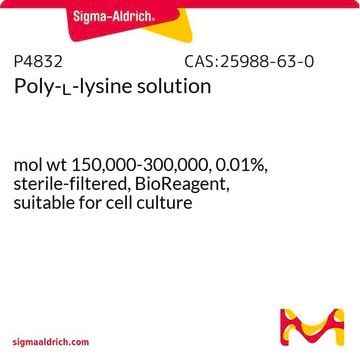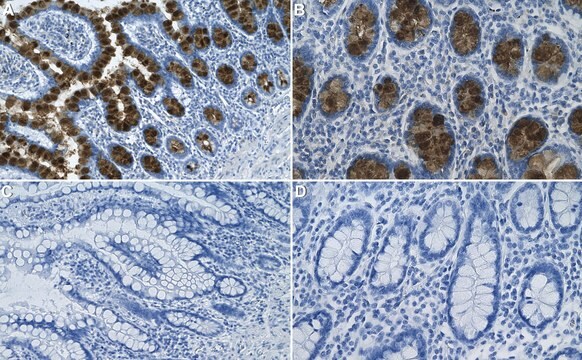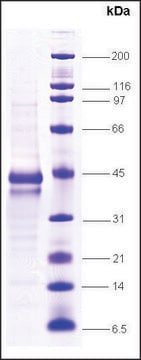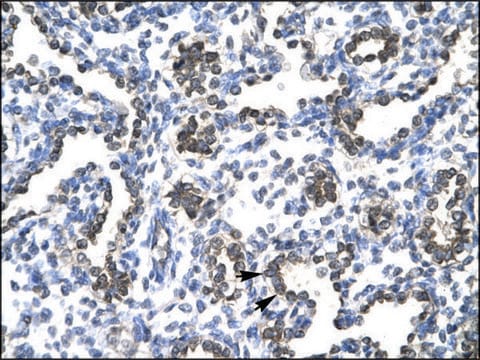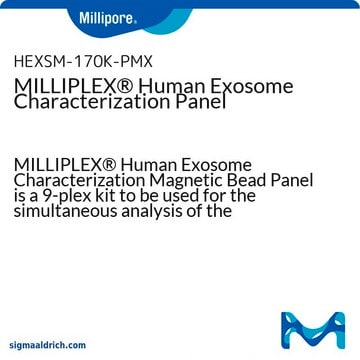ZRB2096
Anti-FosB Antibody, clone 3I8 ZooMAb® Rabbit Monoclonal

recombinant, expressed in HEK 293 cells
Sinónimos:
FosB proto-oncogene AP-1 transcription factor subunit, G0/G1 switch regulatory protein 3, Protein FosB, Transcription factor AP-1 subunit FosB
About This Item
Productos recomendados
biological source
rabbit
Quality Level
recombinant
expressed in HEK 293 cells
conjugate
unconjugated
antibody form
purified antibody
antibody product type
primary antibodies
clone
3I8, recombinant monoclonal
description
recombinant, expressed in HEK 293 cells
product line
ZooMAb® learn more
form
lyophilized
purified by
using Protein A
species reactivity
human
packaging
antibody small pack of 25 μL
greener alternative product characteristics
Waste Prevention
Designing Safer Chemicals
Design for Energy Efficiency
Learn more about the Principles of Green Chemistry.
enhanced validation
recombinant expression
Learn more about Antibody Enhanced Validation
sustainability
Greener Alternative Product
technique(s)
affinity binding assay: suitable
immunocytochemistry: suitable
immunohistochemistry: suitable
western blot: suitable
isotype
IgG
epitope sequence
C-terminal
Protein ID accession no.
UniProt accession no.
shipped in
ambient
storage temp.
2-8°C
Gene Information
human ... FOSB(2354)
General description
Specificity
Immunogen
Application
Evaluated by Western Blotting in HL-60 cell lysate.
Western Blotting Analysis: A 1:1,000 dilution of this antibody detected FosB in HL-60 cell lysate.
Tested Applications
Immunohistochemistry (Paraffin) Analysis: A 1:100 dilution from a representative lot detected FosB in Human placenta tissue sections.
Immunocytochemistry Analysis: A 1:100 dilution from a representative lot detected FosB in HeLa cells.
Affinity Binding Assay: A representative lot of this antibody bound FosB peptide with a KD of 3.7 x 10-7 in an affinity binding assay.
Note: Actual optimal working dilutions must be determined by end user as specimens, and experimental conditions may vary with the end user.
Target description
Physical form
Reconstitution
Storage and Stability
Other Notes
Legal Information
Disclaimer
¿No encuentra el producto adecuado?
Pruebe nuestro Herramienta de selección de productos.
Storage Class
11 - Combustible Solids
wgk_germany
WGK 1
flash_point_f
Not applicable
flash_point_c
Not applicable
Certificados de análisis (COA)
Busque Certificados de análisis (COA) introduciendo el número de lote del producto. Los números de lote se encuentran en la etiqueta del producto después de las palabras «Lot» o «Batch»
¿Ya tiene este producto?
Encuentre la documentación para los productos que ha comprado recientemente en la Biblioteca de documentos.
Nuestro equipo de científicos tiene experiencia en todas las áreas de investigación: Ciencias de la vida, Ciencia de los materiales, Síntesis química, Cromatografía, Analítica y muchas otras.
Póngase en contacto con el Servicio técnico